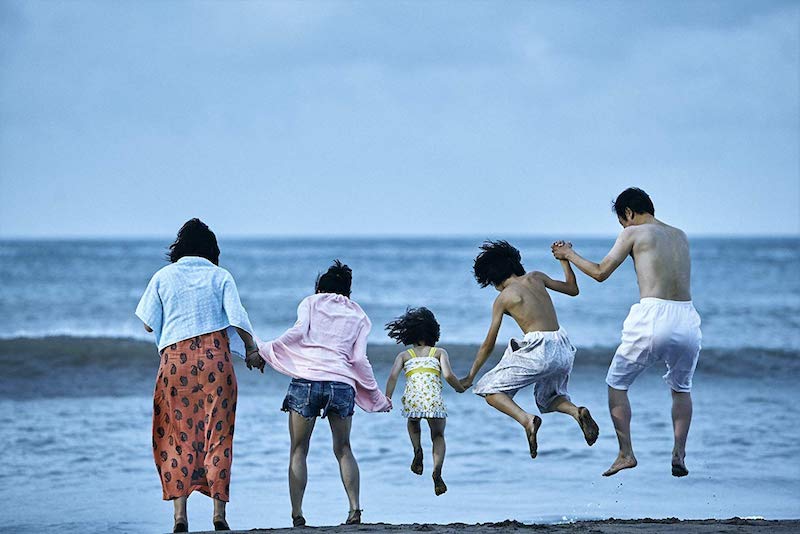Nothing Brings a Family Together Like Thievery
Hirokazu Kore-eda's Palme d’Or winner "Shoplifters" is a different kind of family film for the age of inequality. A still from Hirokazi Kore-eda's "Shoplifters." (IMDb)
A still from Hirokazi Kore-eda's "Shoplifters." (IMDb)
For a variety of reasons, the concept of family has been changing over the past 30 years in Japan, where the rate of marriages and births has dropped to a record low. One in four men is likely to remain a lifelong bachelor, while one in seven women will remain single. Among those who do get married, economic constraints and limited access to child care prevent many from having children.
Shifts in Japanese society have been attributed to the 10-year recession the country suffered in the 1990s, followed by a recovery marked by decreased corporate spending, hiring cuts and increased demand for part-time workers. The broader recovery in recent years has primarily benefited those on the favored side of the country’s widening wealth gap.
Japanese filmmaker Hirokazu Kore-eda’s career parallels his country’s economic trajectory, taking up aspects of the great recession and the severe social impact of a stalled recovery. His latest film, “Shoplifters,” about a different kind of family, unrelated by blood, won the Palme d’Or at Cannes and is Japan’s submission to the 2019 Oscars.
“I am interested in the contemporary family. But I don’t know if I’m concerned about the state of the contemporary Japanese family,” Kore-eda said during a recent press tour in Los Angeles. Sitting in a quiet suite in West Hollywood’s London Hotel, he reflected, “I would say it’s much more personal for me.”
The new film stars Kore-eda regulars like Kirin Kiki, who has appeared in six of his films, and four-time collaborator Lily Franky. Together, they anchor a cast of varying ages and experience levels portraying a clan of individuals with dubious pasts joined as an ad-hoc family. They survive through methods such as shoplifting, showcased in the film’s compelling opening sequence, as Osamu (Franky) and his boy Shota (Jyo Kairi) wind through a market, surreptitiously pinching goods along the way.
Added to their haul, as they make their way home, is a little girl who appears lost in the street. Rather than leave her under a bush for the night, they take her with them. When they later discover she is an unwanted child who might possibly face physical abuse, they decide to keep her. It’s not kidnapping if they don’t ask for ransom, reasons Nobuyo (Ando Sakura).
As per usual in Kore-eda’s movies, the element of surprise springs from his work with his youngest cast members. No director is better at mining little actors’ candid and unsentimental emotion.
“With the children, they never even see a script,” Kore-eda said. “What I’ll do is I will take the child and say, ‘Okay, your dad is going to say this, and you can say this in return to him.’ On the spot, that’s the first time they hear it. And then I will allow the child to basically say it in their own words,” Kore-eda explained, adding that he also spends time with child cast members, shopping or going to dinner. “So I’m building a relationship with them and, in the process, really sort of finding out what words I can communicate with and what works for them. And by the time I get to set, I’ve already got that established relationship.”
The frank portrayals and emotional veracity common to Kore-eda’s movies might stem from his background as a documentary filmmaker in the early 1990s. In 1995, when he finally got a chance to direct a feature film, “Maborosi,” about a woman with a newborn who is suddenly widowed when her husband commits suicide, he won awards at major international festivals, including the Venice Film Festival.
His 2004 film, “Nobody Knows,” is about a 12-year-old who is suddenly left to care for his younger siblings. “Still Walking” (2008) centers on a family gathering to commemorate the death of a son. Working through his filmography, fractured families become a pronounced theme.
Kore-eda’s characters tend to be ordinary people doing what they can to get by. He finds poetry in the everyday, crafting simple scenarios and scenes brimming with naked humanity. As such, more than one film historian, including Roger Ebert, has compared him to the postwar master Yasujiro Ozu, whose classics like “Late Spring” (1949) and “Tokyo Story” (1953) exhibit a similar elegance and simple charm that belie unexpected emotional depth. It’s a comparison Kore-eda grudgingly accepts.
“One of the things that I struggle to relate to is that in the world of Ozu, all the people are very polite and very nice and very good, whereas [in] Naruse’s, they’re more kind of tricky and take advantage of you,” he said. “And they’re no good with money and they’re jealous, they’re just kind of not real nice people in many ways,” he explained, citing Ozu’s contemporary, Mikio Naruse.
Naruse’s films focus on the downtrodden, often unmarried, women and prostitutes, whose backs are to the wall. His 1935 directorial debut, “Wife! Be Like A Rose!”, about a woman who contacts her biological father who had abandoned the family when she was a child, thematically resonates with Kore-eda’s filmography. “I guess if my characters were to appear in a film, they’d probably feel more comfortable in a Naruse film,” he said.
Often, the dynamics of the stories play out with the organic resonance of a fable, as in Kore-eda’s 2013 Cannes Jury Prize winner, “Like Father, Like Son,” in which a well-to-do family of three discovers their 6-year-old boy was switched at birth with one from a working-class family and attempts to switch back.
“That came from a very personal incident,” he said of the acclaimed film. “It was two or three years after my child was born, and I was very busy. I hardly went home at all. I went home for a quick visit and as I was leaving, my daughter came up and said, ‘Oh, please come and visit again.’ And it was quite shocking, and it made me think, what is the relationship between a father and a child? Is it the amount of time that’s spent together, is that what’s really important? And that’s where it led to the movie, ‘Like Father, Like Son,’ rather than some larger social perspective.”
Even so, the larger social perspective is mirrored in Kore-eda’s personal experience, whether he’s aware or not. While “Abenomics,” the economic policy under current Prime Minister Shinzo Abe, has spurred the strongest growth in decades, the main benefactors are the wealthy in Japan’s larger cities. Unemployment is down, but wage growth is stagnant, and with some of the longest hours in the world (some companies requiring up to 80 hours of overtime per month), there is little time left for parenting. As a result, roughly 47 percent of married couples describe their relationship as “sex-free,” and birth rates have dropped to the point where adult diapers are outselling baby diapers.
For his next film, “The Truth,” Kore-eda returns his lens to the family. This time, it consists of a theatrical Paris-based clan led by a famous actor played by Catherine Deneuve. Juliette Binoche plays her less-successful actor daughter, married to a man played by Ethan Hawke.
Kore-eda’s schedule has been mayhem. Right after accepting the Palme d’Or, he flew to New York to cast Hawke and began hitting the festival circuit: Toronto, Vancouver and the U.K. In recent months, he has been shooting “The Truth” in Paris in English, a language he doesn’t speak.
“I don’t understand every moment of it. I certainly have gotten a sense of the rhythm. Is it the right rhythm? Is the feeling being expressed properly? Is it being expressed naturally? Those kinds of aspects, I can pick up on,” he said about directing in English.
And lest you think it’s another heavy movie about a family torn apart through jealousy and neglect, Kore-eda set the record straight. “There is some humor in it,” he said, smiling. “There will be some laughs.”
Your support matters…Independent journalism is under threat and overshadowed by heavily funded mainstream media.
You can help level the playing field. Become a member.
Your tax-deductible contribution keeps us digging beneath the headlines to give you thought-provoking, investigative reporting and analysis that unearths what's really happening- without compromise.
Give today to support our courageous, independent journalists.






You need to be a supporter to comment.
There are currently no responses to this article.
Be the first to respond.